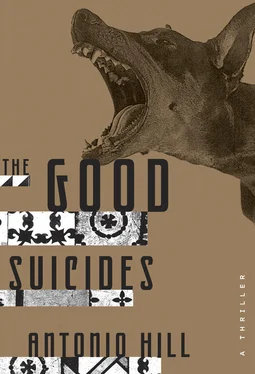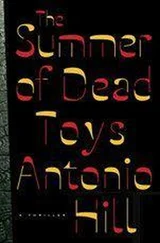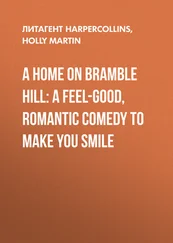Antonio Hill - The Good Suicides
Здесь есть возможность читать онлайн «Antonio Hill - The Good Suicides» весь текст электронной книги совершенно бесплатно (целиком полную версию без сокращений). В некоторых случаях можно слушать аудио, скачать через торрент в формате fb2 и присутствует краткое содержание. Жанр: Триллер, на английском языке. Описание произведения, (предисловие) а так же отзывы посетителей доступны на портале библиотеки ЛибКат.
- Название:The Good Suicides
- Автор:
- Жанр:
- Год:неизвестен
- ISBN:нет данных
- Рейтинг книги:5 / 5. Голосов: 1
-
Избранное:Добавить в избранное
- Отзывы:
-
Ваша оценка:
- 100
- 1
- 2
- 3
- 4
- 5
The Good Suicides: краткое содержание, описание и аннотация
Предлагаем к чтению аннотацию, описание, краткое содержание или предисловие (зависит от того, что написал сам автор книги «The Good Suicides»). Если вы не нашли необходимую информацию о книге — напишите в комментариях, мы постараемся отыскать её.
The Good Suicides — читать онлайн бесплатно полную книгу (весь текст) целиком
Ниже представлен текст книги, разбитый по страницам. Система сохранения места последней прочитанной страницы, позволяет с удобством читать онлайн бесплатно книгу «The Good Suicides», без необходимости каждый раз заново искать на чём Вы остановились. Поставьте закладку, и сможете в любой момент перейти на страницу, на которой закончили чтение.
Интервал:
Закладка:
Just as in Madrid, during his first year in Barcelona there were memorable nights and others to be forgotten. But there was something stimulating even in the worst nights. Nonetheless, little by little, they all started to blend into one: the good and bad were blending into a single category, mediocre and gray. The same men, the same dark rooms, the same bars. The same glances that, requiring no words, set in motion the complex yet simple mechanism of sex. And then, when tedium threatened to devour him, or perhaps because of that, David appeared.
David, his husband, who was at that moment asleep hugging the pillow as if it were a lifejacket. David who went to bed at twelve at the latest and awoke at seven, brimming with energy. David, who hunted the wolf and converted him into a friendly little domestic animal. Brais had never had problems accepting his homosexuality, not even back in Galicia twenty years ago, in those rainy lands he’d hated so much and now had begun to yearn for. Probably the lack of a family smoothed the way for him: there was no one to come out to, or at least no one who would care. But had he been one of those who hide their true desires, David’s presence would have dissolved the least hint of fear or shame. Because loving someone so much couldn’t be bad. For that reason they had married, in a symbolic gesture: to proclaim to the world that they were together, would be together and, with a bit of luck, would grow old together. An old age that still seemed distant. Brais was thirty-seven; his husband had just turned thirty-one. Life stretched before them as a long, happy road. Nonetheless, that night the road appeared to be cut short, to lead to a sheer and dangerous precipice. At least for him.
A night of eternal minutes, a dawn refusing to come. It’s almost three when, sick of thinking, Brais gets out of bed, and barefoot, moves toward the laptop he’d left on the dining-room table. He knows he shouldn’t look at it, but there is something perverse in that image that he finds addictive.
The photo is attached to an email of two words. “Never forget.” As if anyone could forget that. Brais closes his eyes for a few seconds, the time it takes for the photo to open. Despite already knowing what it contains, his whole body tenses. Leaning slightly forward, both hands resting on the table, he contemplates the screen and feels the desire to destroy it with a fist. He could do it, but there’s no point. The three strangled dogs would still be in his head: their slack jaws, stretched necks, rigid paws.
He remains still, tense for a few more minutes. His body demands action, to react in some physical way to this fixed, unshakable stimulus. Because of this, still standing, he closes the window with the image and returns to his email. He composes a quick message and sends it to the personal email accounts of the five people involved: Sílvia Alemany, César Calvo, Amanda Bonet, Manel Caballero and the oldest of all, Octavi Pujades. Those still alive, he thinks indifferently. Those who can still save themselves.
Then he goes back to bed and embraces his husband in a vague attempt to catch that tranquillity of spirit that bestows a deep, restorative sleep on David, the sleep of the innocent. This is all that matters, thinks Brais, being able to sleep with David by his side for what is left of his life.
For months now day and night have become a kind of continual slumber for Octavi Pujades. He’s read somewhere that this was used as a means of coercion for prisoners of war: when the notions of time and space disappeared, the mind lost its footing and tumbled into incoherency. He wants to believe that’s not the case with him, that his brain still functions with the same precision, that he analyzes and decides using pure logic. For Octavi, financial director of Alemany Cosmetics for over twenty years, two plus two have always equaled four on balance sheets and in life. So it makes him uncomfortable that in other professions, other spheres, people could be so inexact, so mathematically incorrect.
When his wife was diagnosed with the cancer that has her lying prostrate in bed, the doctor affirmed that, unfortunately, Eugènia wouldn’t see in the New Year. In his actual words, it would be an achievement if she managed to survive until Christmas. And Octavi Pujades therefore acted according to this prognosis. He spoke to Sílvia and Víctor, appointed an acting replacement-not whom he would have chosen, but the only one possible given the circumstances-and took some months of leave to nurse his wife. Eugènia had asked only one thing of him: to die at home. In the same space they had lived in for eighteen years, since they exchanged the city apartment for this detached house in Torrelles de Llobregat, in an area where there were still birds. He’d made her that promise and taken on the task with the same discipline he applied to his work environment. It would be five months at most, from August until the end of the year, a substantial but not excessive amount of time. He was relatively sure that Gaspar Ródenas, the chosen replacement, would fulfill his role and at the same time keep him informed. Never, in the worst moments of doubt, did it cross his mind that Gaspar would die before Eugènia and in the end he would have to resort to the person who should have been the first choice. Life has a strange way of seeking justice, he thought. At one time they used to say the Lord worked in mysterious ways, which came to more or less the same thing.
This dawn, Octavi enters what was once his bedroom and is now a death chamber with a corpse refusing to die. He finds the strength with which Eugènia clings to this world, to these scant hours of consciousness without pain that make up her life, admirable and surprising at the same time. He’d never have believed that this tiny slim body could harbor such a capacity for resistance, such a desire to face death, huddled in some corner of the room, a vulture ready to drive its claws into its prey.
Eugènia is sleeping. The medication keeps her sedated for the greater part of the day. He knows he is doing everything possible. Nonetheless, however much he tries to force himself, he can’t manage to share this bed with her, and this pains him. At the beginning, he moved to his eldest son’s room, empty since his marriage. In fact, when Eugènia dies, he will sell this house. It’s absurd to keep such a big house, built for a family of at least five. He tells his wife so, despite her not being able to hear him. He does what he has not done in years of marriage: explains his plans to her, taking into account the opinion she would express if she could. The good thing about being married to the same person for so long is that in eighty percent of cases you know what they will say to you. Or what she would say if she were in control of her faculties.
He talks to her then about their son, who has come to see her that evening while she was dozing; about their daughter, who refuses to visit them because every time she does she breaks down in tears; and about their other daughter, the youngest, the most troubled, who shows up unannounced and leaves without saying good-bye. Octavi trusts his wife’s opinion about her. Don’t worry, she has always told him; there are people who find their path naturally and others who need to go around and around, step backward to then suddenly advance. And when the time comes, Mireia will take a jump that leaves us all behind.
Once he has exhausted the subject of the children, Octavi goes on talking. After a few seconds he glances at the ceiling, as if he fears that having heard his confession, this predatory killer will switch victims and take him. As he took Gaspar and has taken Sara, leaving only that foul photograph as a note. And without wanting to, he remembers Gaspar’s words when he came to see him, that phrase branded into his mind. “We don’t deserve anything else. We’ll all end up like that, Octavi. Dead like dogs.”
Читать дальшеИнтервал:
Закладка:
Похожие книги на «The Good Suicides»
Представляем Вашему вниманию похожие книги на «The Good Suicides» списком для выбора. Мы отобрали схожую по названию и смыслу литературу в надежде предоставить читателям больше вариантов отыскать новые, интересные, ещё непрочитанные произведения.
Обсуждение, отзывы о книге «The Good Suicides» и просто собственные мнения читателей. Оставьте ваши комментарии, напишите, что Вы думаете о произведении, его смысле или главных героях. Укажите что конкретно понравилось, а что нет, и почему Вы так считаете.












